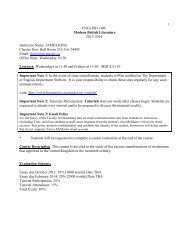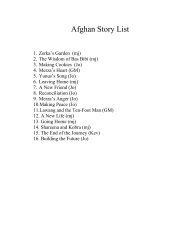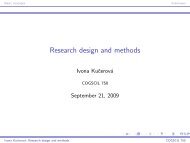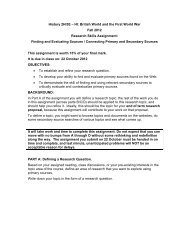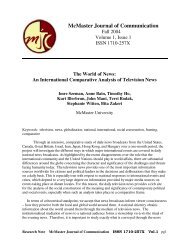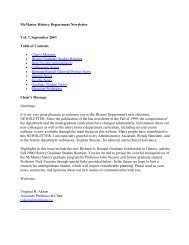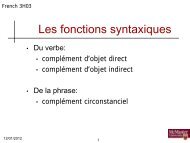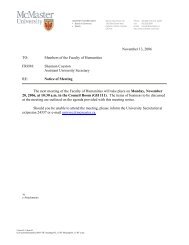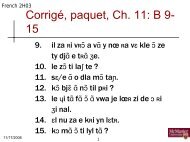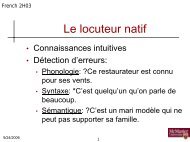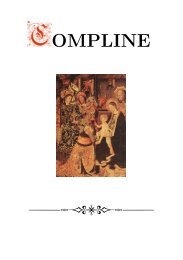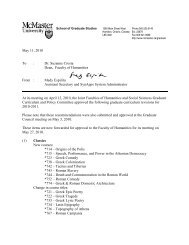Witchcraft course: - Faculty of Humanities - McMaster University
Witchcraft course: - Faculty of Humanities - McMaster University
Witchcraft course: - Faculty of Humanities - McMaster University
Create successful ePaper yourself
Turn your PDF publications into a flip-book with our unique Google optimized e-Paper software.
3HI3: Advance Historical Inquiry<br />
The European Witchcraze<br />
Pr<strong>of</strong>. M. Armstrong<br />
Time/Day: Mon 11:30-2:20pm, GS 102<br />
Office hours: Mon 2:30-3:30pm<br />
Office: CNH 626<br />
Contact: marmstr@mcmaster.ca<br />
Summary<br />
The European witchcraze (1500-1700) remains one <strong>of</strong> the most fascinating and disturbing<br />
episodes in European history. This is in part because it confronts us with a historical reality<br />
that seems on the surface quite different from that found in the West today. Students are <strong>of</strong>ten<br />
puzzled, for example, by the intensity and widespread nature <strong>of</strong> belief in witchcraft at that<br />
time, and in the use <strong>of</strong> judicial torture on accused witnesses. Over the last several decades,<br />
scholars have found the witchcraze useful for rethinking long held assumptions about the<br />
intellectual, political and social character <strong>of</strong> the early modern period. The witchcraze after all<br />
coincided with the Renaissance, a time <strong>of</strong> intense intellectual ferment that is <strong>of</strong>ten linked to<br />
fundamental changes in scientific knowledge. The predominance <strong>of</strong> women among the<br />
accused also points to a gendered historical culture that remained persistently unfavourable,<br />
and even hostile, to women. Still other scholars find witch trials appearing in locales struck<br />
by religious division in the wake <strong>of</strong> the Reformation, and/or economic and social dislocation.<br />
It is precisely because <strong>of</strong> its popularity as a field <strong>of</strong> historical investigation that the witchcraze<br />
is well suited for a <strong>course</strong> focused upon the examination <strong>of</strong> changing historical approaches.<br />
Over the following ten weeks, students will be introduced to the study <strong>of</strong> the Witchcraze from<br />
many different perspectives.<br />
Course Expectations:<br />
Advanced Historical Inquiry has emerged as an initiative in the Department <strong>of</strong> History after<br />
extensive discussions about what we as historians feel students need to know about the<br />
practice and habits <strong>of</strong> the field. 3HI3 is intended to engage students in an exploration <strong>of</strong> both<br />
the philosophical and scientific aspects <strong>of</strong> the study <strong>of</strong> human societies while encouraging the<br />
further development <strong>of</strong> a critical eye to sources and narrations <strong>of</strong> historical events in texts and<br />
on the web.<br />
Students will develop a deeper understanding and appreciation <strong>of</strong> the historical craft; acquire<br />
a more nuanced reading <strong>of</strong> secondary sources, with an eye to their place within existing<br />
fields’ literature, themes, etc.; compare and contrast competing perspectives within specific<br />
historiographic debates; search for and identify potential research questions that emerge from<br />
their readings and discussions, and hone written and oral communication skills.<br />
1
Required Texts:<br />
Mark T Gilderhus, History and Historians: A Historiographical introduction<br />
The Hammer <strong>of</strong> the Witches: A Complete Translation <strong>of</strong> the Malleus Maleficarum<br />
(Cambridge, 2009).<br />
Lyndal Roper, Oedipus and the Devil: <strong>Witchcraft</strong> Religion and Sexuality in Early Modern<br />
Europe (1994).<br />
*all other materials are available either as e-books through the <strong>McMaster</strong> library website or as<br />
pdfs on Avenue to Learn<br />
Grading<br />
25% participation<br />
40% two short essays (1000 each) (2 x 20%)<br />
35% historiographical essay (3000 words)<br />
Submission <strong>of</strong> Course Work<br />
Students are advised to retain a photocopy <strong>of</strong> each essay they submit, and to keep all research<br />
notes for their essays. History essays will be marked for clarity <strong>of</strong> writing, grammar, and<br />
organization, in addition to content and analysis. Work should be submitted on time.<br />
Permission to submit a late assignment is at the discretion <strong>of</strong> the instructor and, except in<br />
exceptional instances, a penalty will be imposed for late submission without prior discussion<br />
with me (3% per day).<br />
Extensions and Accommodations (MSAF)<br />
Extensions or other accommodations will be determined by the instructor and will only be<br />
considered if supported by appropriate documentation. Absences <strong>of</strong> less than 5 days may be<br />
reported using the <strong>McMaster</strong> Student Absence Form (MSAF) at www.mcmaster.ca/msaf/. If<br />
you are unable to use the MSAF, you should document the absence with your faculty <strong>of</strong>fice.<br />
In all cases, it is YOUR responsibility to follow up with the instructor immediately to see if an<br />
extension or other accommodation will be granted, and what form it will take. There are NO<br />
automatic extensions or accommodations.<br />
Academic Integrity Language:<br />
You are expected to exhibit honesty and use ethical behaviour in all aspects <strong>of</strong> the learning<br />
process. Academic credentials you earn are rooted in principles <strong>of</strong> honesty and academic<br />
integrity.<br />
Academic dishonesty is to knowingly act or fail to act in a way that results or could result in<br />
unearned academic credit or advantage. This behaviour can result in serious consequences,<br />
e.g. the grade <strong>of</strong> zero on an assignment, loss <strong>of</strong> credit with a notation on the transcript<br />
(notation reads: “Grade <strong>of</strong> F assigned for academic dishonesty”), and/or suspension or<br />
expulsion from the university.<br />
It is your responsibility to understand what constitutes academic dishonesty. For information<br />
on the various types <strong>of</strong> academic dishonesty please refer to the Academic Integrity Policy,<br />
located at http://www.mcmaster.ca/academicintegrity<br />
2
The following illustrates only three forms <strong>of</strong> academic dishonesty:<br />
1.Plagiarism, e.g. the submission <strong>of</strong> work that is not one’s own or for which other credit has<br />
been obtained.<br />
2.Improper collaboration in group work.<br />
3.Copying or using unauthorized aids in tests and examinations.<br />
Plagiarism and any other form <strong>of</strong> academic dishonesty will not be accepted in this <strong>course</strong>. If<br />
you are at all unsure what constitutes plagiarism, please consult with your tutorial instructor.<br />
E-mail Communication<br />
It is the policy <strong>of</strong> the <strong>Faculty</strong> <strong>of</strong> <strong>Humanities</strong> that all email communication sent from students<br />
to instructors (including TAs), and from students to staff, must originate from the student's<br />
own <strong>McMaster</strong> <strong>University</strong> email account. This policy protects confidentiality and confirms<br />
the identity <strong>of</strong> the student. Instructors will delete emails that do not originate from a<br />
<strong>McMaster</strong> email account.<br />
Avenue to Learn <strong>course</strong> website<br />
Access to Avenue to Learn is through your <strong>McMaster</strong> email account. Students should be<br />
aware that, when they access the electronic components <strong>of</strong> this <strong>course</strong>, private information<br />
such as first and last names, user names for the <strong>McMaster</strong> e-mail accounts, and program<br />
affiliation may become apparent to all other students in the same <strong>course</strong>. The available<br />
information is dependent on the technology used. Continuation in this <strong>course</strong> will be deemed<br />
consent to this disclosure.<br />
Modifications to Course Outline:<br />
The instructor and university reserve the right to modify elements <strong>of</strong> the <strong>course</strong> during the<br />
term. The university may change the dates and deadlines for any or all <strong>course</strong>s in extreme<br />
circumstances. If either type <strong>of</strong> modification becomes necessary, reasonable notice and<br />
communication with the students will be given with explanation and the opportunity to<br />
comment on changes. It is the responsibility <strong>of</strong> the student to check their <strong>McMaster</strong> email and<br />
<strong>course</strong> websites weekly during the term and to note any changes.<br />
3
Monday Jan 7<br />
Week 1: introduction<br />
Guilderhus, ch. 1<br />
SCHEDULE<br />
Monday Jan 14<br />
Guilderhus, ch. 2<br />
Week 2: The Hammer <strong>of</strong> the Witches: Malleus Maleficarum<br />
Ques: This primary source was one <strong>of</strong> the most popular and influential manuals on witch<br />
craft. What does it tell us about the core elements <strong>of</strong> belief in witchcraft during the early<br />
modern period? Who were the authors? Why is this significant?<br />
Monday Jan 21<br />
Gilderhus, chs. 3, 4<br />
Week 3: <strong>Witchcraft</strong>, Keith Thomas and Anthropology<br />
Ques: How does Thomas argue for the use <strong>of</strong> cultural anthropology to study withcraft? What<br />
were the critiques <strong>of</strong> those who challenged this approach?<br />
Keith Thomas, “An Anthropology <strong>of</strong> Religion and Magic, II” Journal <strong>of</strong> Interdisciplinary<br />
History 6 (1975): 91-109.<br />
Monday Jan 28<br />
Week 4: Regional/Local approaches<br />
Ques: Where do we see the influence <strong>of</strong> anthropological methodologies and theories in this<br />
analysis <strong>of</strong> the Salem witch trials?<br />
Boyer and Nissenbaum, Salem Possessed (e-book through Library), chs. 1, 2<br />
Robin Briggs, “Women as Victims? Witches Judges and the Community,” French History 5<br />
(1991): 438-450.<br />
Monday Feb 4<br />
Gilderhus, ch. 5<br />
Week 5: <strong>Witchcraft</strong>, Medicine and the Natural World<br />
Wolfgang Behringer, “Weather, Hunger and Fear: Origins <strong>of</strong> the European Witch Hunts in<br />
Climate, Society and Mentality,” German History 13 (1995): 1-27.<br />
Blécourt, W., “Witch Doctors, Soothsayers and Priests. On Cunning Folk in European<br />
Historiography and Tradition,” Social History, 19 (1994): 285–303.<br />
First short paper due in class: on this week’s readings<br />
4
Mon Feb 11<br />
Week 6: The Law, the State and <strong>Witchcraft</strong><br />
Ques: What does the legal perspective bring to the study <strong>of</strong> witchcraft? What can the legal<br />
study <strong>of</strong> witchcraft tell us about early modern justice?<br />
Alfred Soman, “The Parlement <strong>of</strong> Paris and the Great Witch Hunt,” The Sixteenth Century<br />
Journal 9 (1978): 30-44.<br />
Brian Levack, “The Great Scottish Witch hunt <strong>of</strong> 1661-1662,” The Journal <strong>of</strong> British Studies<br />
20 (1980): 90-108.<br />
Diana Paton, “<strong>Witchcraft</strong>, Poison, law, and Atlantic Slavery,” The William and Mary<br />
Quarterly 69 (2012): 235-264.<br />
Monday Feb 18<br />
Week 7: Intellectual history<br />
Ques: Why do these historians emphasize the “rational” nature <strong>of</strong> witchcraft?<br />
R Kiekefer, “The specific rationality <strong>of</strong> medieval witchcraft,” American Historical Review 99<br />
(1994): 813-836.<br />
Stuart Clarke, “Inversion, Misrule, and the Meaning <strong>of</strong> <strong>Witchcraft</strong>,” Past and Present<br />
Monday Feb 25<br />
Week 8: Reading Week<br />
Monday March 4<br />
Week 9: Gender<br />
Ques: How has the focus on gender shaped scholarship on the witchcraze?<br />
Anne Barstow, “On Studying <strong>Witchcraft</strong> as Women’s History,” Journal <strong>of</strong> Feminist Studies in<br />
Religion 4(1988): 7-19.<br />
R. Monter, “Toads and Eucharists: The Male Witches <strong>of</strong> Normandy, 1564-1660” French<br />
Historical Studies 20 (1997): 563-595.<br />
Tamar Herzig, “Flies, Heretics, and the Gendering <strong>of</strong> <strong>Witchcraft</strong>,” Magic, Ritual and<br />
<strong>Witchcraft</strong> 5 (2010): 51-80.<br />
*Second short paper due: on gender<br />
Monday March 11<br />
Week 10: Psychoanalysis<br />
Ques: What does a psychoanalytical approach assume about past societies? About human<br />
nature?<br />
5
Lyndal Roper, Oedipus and the Devil: <strong>Witchcraft</strong> Religion and Sexuality in Early Modern<br />
Europe (1994).<br />
Monday March 18<br />
Week 11: Psychoanalysis (Part II)<br />
John Demos, “Underlying themes in the <strong>Witchcraft</strong> <strong>of</strong> Seventeenth Century England.” AHR<br />
75 (1970): 1311-1326.<br />
Charles Zika, “Cannibalism and <strong>Witchcraft</strong> in Early Modern Europe: Reading the Visual<br />
Images,” The History Workshop Journal 44 (1997): 77-105.<br />
March 25: Post-modernism<br />
Gilderhus, ch. 7<br />
Week 12:<br />
Ques: What do these scholars mean by the “dis<strong>course</strong>s” or “narratives” <strong>of</strong> magic and<br />
witchcraft? What do they mean? How is this approach fruitful?<br />
Alison Rowlands, “Telling <strong>Witchcraft</strong> stories: new perspectives on <strong>Witchcraft</strong> and Witches in<br />
the Early Modern Period,” Gender and History 10 (1998):<br />
Michael Bailey, “The Meanings <strong>of</strong> Magic,” Magic, Ritual and <strong>Witchcraft</strong> 1 (2006):<br />
April 1<br />
Week 13: TBA<br />
April 8<br />
Week 14: No class. Submit final paper<br />
6



